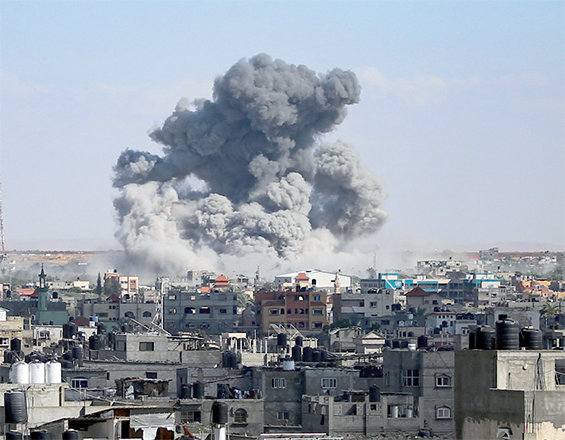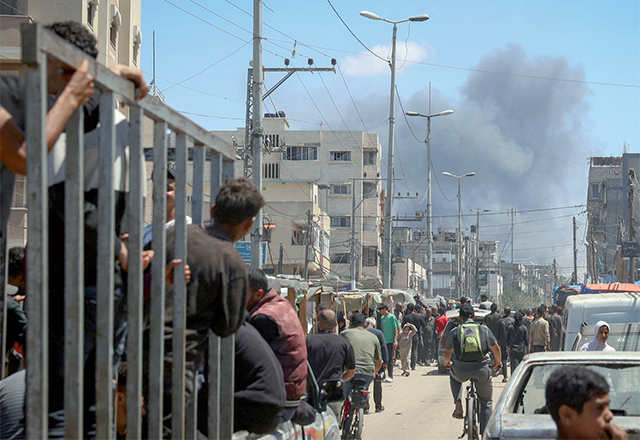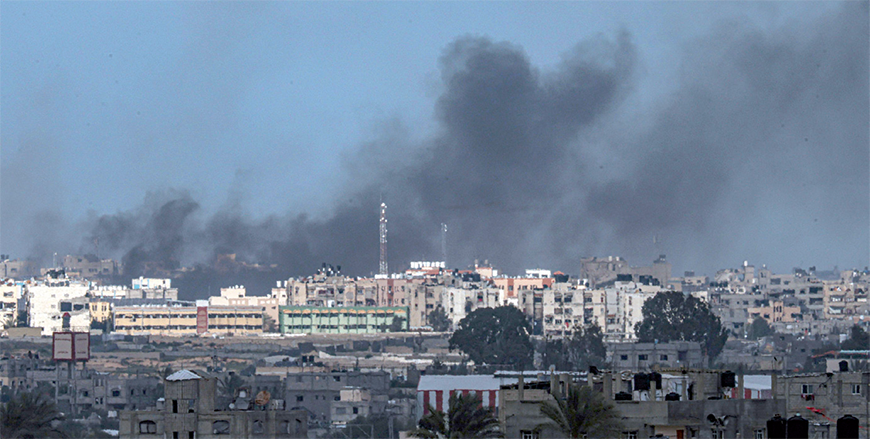You are here
Israel orders evacuation from Rafah area in south Gaza
By AFP - May 07,2024 - Last updated at May 07,2024

Smoke billows after Israeli bombardment in Rafah, in the southern Gaza Strip on Monday (AFP photo)
RAFAH, Palestinian Territories — Israel's military on Monday called for the evacuation of Palestinians from eastern Rafah ahead of a ground invasion of the city, as Gaza aid officials said Israeli jets struck two areas where the warning had been issued.
The evacuation call followed intensified disagreement between Israel and Hamas over the Islamist group's demands to end the seven-month war, during weekend talks in Cairo.
US President Joe Biden "reiterated his clear position" to prime minister Benjamin Netanyahu on Monday after Israel defied US warnings and told Palestinians to evacuate part of the southern Gaza city of Rafah, the White House said.
Netanyahu meanwhile "agreed to ensure the Kerem Shalom crossing is open for humanitarian assistance for those in need", it added in a readout of their call, after Israel closed the key Gaza border crossing following a Hamas rocket attack.
Consultations between two other mediators, the United States and Qatar, were expected on Monday in Doha but state-linked media in Egypt said negotiations had stalled after a rocket strike killed four Israeli soldiers on Sunday.
Netanyahu has vowed to send ground troops in against Hamas fighters in Rafah regardless of any truce, and despite concerns from the United States, other countries and aid groups.
The "limited" and temporary evacuation order aimed "to get people out of harm's way" and followed the deadly rocket fire that Israel's military said came from an area adjacent to Rafah.
Gazan civil defence and aid officials said on Monday that Israeli jets had struck Al Shuka and Al Salam, among other areas, both of which were told to evacuate the day before.
The main aid group in Gaza, UNRWA, said “an Israeli offensive in Rafah would mean more civilian suffering and deaths”.
It added that it “is not evacuating”.
When asked how many people should move, a military spokesman said: “The estimate is around 100,000 people.”
However, Ossama Al Kahlut, a Palestine Red Crescent representative in east Rafah, said the designated evacuation zone hosts around 250,000 people, many of whom are already uprooted from elsewhere in Gaza.
‘Where can we go?’
One resident, Abdul Rahman Abu Jazar, 36, said the area his family was told to seek refuge in “does not have enough room for us to make tents” because it is already full of displaced people.
“Where we can go?” he asked AFP.
US Secretary of State Antony Blinken on Friday said Israel had yet to present “a credible plan” to protect civilians during the ground invasion that it has threatened for weeks.
Without it, Washington “can’t support a major military operation going into Rafah”, Blinken said.
And on Monday EU foreign affairs chief Josep Borrell called the evacuation orders “unacceptable”. They “portend the worst: more war and famine”, he said, urging Israel to “renounce” a ground offensive.
The French foreign ministry said it was “strongly opposed” to an offensive on Rafah.
Jean-Raphael Poitou, Middle East coordinator for the Action Against Hunger charity, told AFP that the areas now opened for evacuees had previously been “closed because they were considered dangerous”.
Gaza’s bloodiest-ever war began following Hamas’s unprecedented October 7 attack on Israel that resulted in the deaths of more than 1,170 people, according to an AFP tally of Israeli official figures.
Israel estimates that 128 of the hostages abducted by militants on October 7 remain in Gaza, including 35 whom the military says are dead.
Vowing to destroy Hamas, Israel has conducted a retaliatory offensive that has killed at least 34,735 people in Gaza, mostly women and children, according to the Hamas-run territory’s health ministry.
About 1.2 million people are sheltering in Rafah, according to the World Health Organisation.
In a statement, the Israeli military appealed for residents in the city’s eastern zone to move to the “expanded humanitarian area” at Al Mawasi on Gaza’s nearby coast.
The area “includes field hospitals, tents and increased amounts of food, water, medication and additional supplies”, it said.
Repeatedly bombed
Soon after the war started, Israel told Palestinians living in northern Gaza to move to “safe zones” in the south — including Rafah near the Egyptian border.
But Rafah has been repeatedly bombed from the air — including on Monday following the evacuation order — and Palestinians frequently say that nowhere in Gaza is safe.
In late March, Gaza’s health ministry said at least 12 people were killed when an air strike hit a tent for displaced people in Al Mawasi.
The Israeli military told AFP at the time that it was looking into the report.
Medics and first responders said Israeli air strikes killed 16 people in Rafah on Sunday. The strikes came hours after Hamas rocket fire killed the Israeli soldiers in the Kerem Shalom border crossing area between southern Israel and Gaza.
The strike led Israeli authorities to close the crossing, used to deliver aid into Gaza, and in response the military said its air force destroyed launchers from which the projectiles were fired.
Al-Qahera News, linked to Egyptian intelligence services, cited a high-level source on Monday as saying the rocket strike has “caused truce negotiations to bog down”.
Holocaust Remembrance Day
Despite the evacuation order, Hamas spokesman Abdul Latif al-Qanou told AFP the movement “will continue the negotiations positively and with an open heart”.
CIA director Bill Burns, a mediator in the talks, is expected in Doha to meet with Qatar’s prime minister for “emergency” discussions, a source with knowledge of the truce talks told AFP on Sunday.
The source, requesting anonymity due to the sensitivity of the issue, said the meeting would try “to see if the talks can be brought back on track”.
A Hamas official close to the negotiations said Sunday the group’s negotiators were headed from Cairo to Doha for “consultations”, after the weekend round failed to produce a breakthrough.
Hamas negotiators are then due back in Cairo on Tuesday, Al Qahera News said.
Talks took place Sunday without an Israeli delegation present.
Netanyahu, however, made his voice heard.
Speaking at a Holocaust Remembrance Day ceremony in Jerusalem, he denounced a “volcano of anti-Semitism” and international criticism of Israel’s war in Gaza.
“If Israel is forced to stand alone, Israel will stand alone,” Netanyahu said.
The Qatar-based political chief of Hamas, Ismail Haniyeh, accused Netanyahu of sabotaging the talks, which Netanyahu’s office on Monday called “an absolute lie”.
Joost Hiltermann, Middle East and North Africa programme director at the International Crisis Group think tank, told AFP that both the Hamas rocket fire on Sunday, and Israel’s evacuation order, can be seen in the context of the truce talks.
“Whenever there’s a breakdown, then the violence escalates,” he said.
Related Articles
RAFAH, Palestinian Territories — Israel sent tanks into Rafah in southern Gaza, seizing control of the border crossing with Egypt on Tuesday
GAZA STRIP, Palestinian Territories — Israeli forces carried out deadly strikes on Tuesday on southern Gaza and battled fighters after the a
GAZA STRIP, Palestinian Territories — Israel launched a new wave of deadly strikes on southern Gaza on Thursday after vowing to push ahead w














